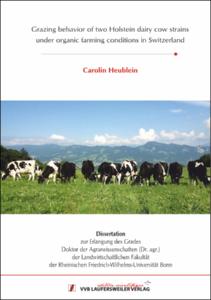Heublein, Carolin: Grazing behavior of two Holstein dairy cow strains under organic farming conditions in Switzerland. - Bonn, 2017. - Dissertation, Rheinische Friedrich-Wilhelms-Universität Bonn.
Online-Ausgabe in bonndoc: https://nbn-resolving.org/urn:nbn:de:hbz:5n-47144
Online-Ausgabe in bonndoc: https://nbn-resolving.org/urn:nbn:de:hbz:5n-47144
@phdthesis{handle:20.500.11811/7017,
urn: https://nbn-resolving.org/urn:nbn:de:hbz:5n-47144,
author = {{Carolin Heublein}},
title = {Grazing behavior of two Holstein dairy cow strains under organic farming conditions in Switzerland},
school = {Rheinische Friedrich-Wilhelms-Universität Bonn},
year = 2017,
month = apr,
note = {The aim of the thesis was to test if concentrate supplementation is required in an organic, pasture-based feeding system and if concentrate supplementation influences grazing behavior. The study consisted of two trials, both with a crossover design performed on an organic farm in Switzerland with 12 Swiss Holstein cows and 12 Holstein cows of New Zealand origin. In the first trial the focus was on the impact of concentrate supplementation on milk yield and composition, grazing and rumination behavior, physical activity, and blood metabolites and the differences between the two cow strains. In the second trial the focus laid on the estimation of plant species selection by dairy cows with plant wax markers and whether differences exist between concentrates supplemented and non-supplemented cows in selection behavior.
Concentrate supplementation had an impact on milk yield and composition, the time animals spent grazing, herbage dry matter intake and physical activity, but no on rumination behavior. Supplemented cows had a more stable energy status, but no indices for strong negative energy balance were recorded for non-supplemented cows, for both cow strains. In the second trial the main focus was on the estimation of herbage composition of grazing dairy cows with plant wax markers, namely alkanes, long-chain fatty acids and long-chain alcohols (LCOH). Concentrate samples, feces samples from each cow and samples from each paddock were taken and plant species were manually separated. All plant species, concentrate and feces samples were analyzed for their marker contents. Corrections of fecal recovery were calculated in relation to dosed ytterbium. The estimations of diet composition were performed with the software “EatWhat” based on non-negative least squares. Results were compared to the botanical composition with the Aitchison distance. The most accurate diet composition estimation was achieved with alkanes, LCOH and a correction of fecal recovery. No differences in selected plant composition between cow strains were recorded, but supplemented cows selected more Trifolium repens compared to non-supplemented cows. However, further studies are required to confirm the feasibility of the approach and validate the calculation of fecal recovery. Understanding the grazing behavior and the consequences of concentrate supplementation may lead to management measures that increase production efficiency and ensure animal welfare. Minor differences between cow strains indicated that both are suitable for pasture-based feeding systems. However, short-term trials cannot give a conclusion for the whole lactation, and fertility and health traits should be included.},
url = {https://hdl.handle.net/20.500.11811/7017}
}
urn: https://nbn-resolving.org/urn:nbn:de:hbz:5n-47144,
author = {{Carolin Heublein}},
title = {Grazing behavior of two Holstein dairy cow strains under organic farming conditions in Switzerland},
school = {Rheinische Friedrich-Wilhelms-Universität Bonn},
year = 2017,
month = apr,
note = {The aim of the thesis was to test if concentrate supplementation is required in an organic, pasture-based feeding system and if concentrate supplementation influences grazing behavior. The study consisted of two trials, both with a crossover design performed on an organic farm in Switzerland with 12 Swiss Holstein cows and 12 Holstein cows of New Zealand origin. In the first trial the focus was on the impact of concentrate supplementation on milk yield and composition, grazing and rumination behavior, physical activity, and blood metabolites and the differences between the two cow strains. In the second trial the focus laid on the estimation of plant species selection by dairy cows with plant wax markers and whether differences exist between concentrates supplemented and non-supplemented cows in selection behavior.
Concentrate supplementation had an impact on milk yield and composition, the time animals spent grazing, herbage dry matter intake and physical activity, but no on rumination behavior. Supplemented cows had a more stable energy status, but no indices for strong negative energy balance were recorded for non-supplemented cows, for both cow strains. In the second trial the main focus was on the estimation of herbage composition of grazing dairy cows with plant wax markers, namely alkanes, long-chain fatty acids and long-chain alcohols (LCOH). Concentrate samples, feces samples from each cow and samples from each paddock were taken and plant species were manually separated. All plant species, concentrate and feces samples were analyzed for their marker contents. Corrections of fecal recovery were calculated in relation to dosed ytterbium. The estimations of diet composition were performed with the software “EatWhat” based on non-negative least squares. Results were compared to the botanical composition with the Aitchison distance. The most accurate diet composition estimation was achieved with alkanes, LCOH and a correction of fecal recovery. No differences in selected plant composition between cow strains were recorded, but supplemented cows selected more Trifolium repens compared to non-supplemented cows. However, further studies are required to confirm the feasibility of the approach and validate the calculation of fecal recovery. Understanding the grazing behavior and the consequences of concentrate supplementation may lead to management measures that increase production efficiency and ensure animal welfare. Minor differences between cow strains indicated that both are suitable for pasture-based feeding systems. However, short-term trials cannot give a conclusion for the whole lactation, and fertility and health traits should be included.},
url = {https://hdl.handle.net/20.500.11811/7017}
}






